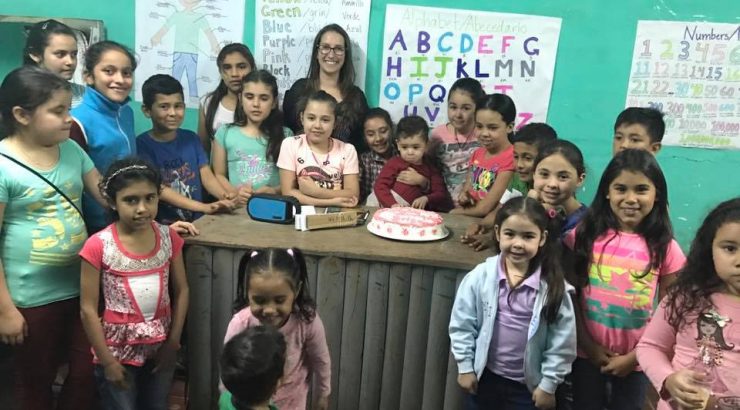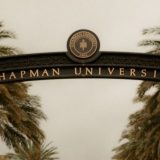
Alumni Spotlight: Lauren Frey ’16 Health Sciences alumna talks to us about her extraordinary Peace Corps journey in Paraguay
September 28, 2018
CHBS: What made you decide to join the Peace Corps after you completed your B.S. in Health Science from Chapman?
LF: During my time at Chapman, I was part of the Global Medical Brigades club. With this group, I went on two medical brigades in Honduras. Once there, we set up a clinic for four days in a community that had no other access to medical care. During our short time in this community, we provided free medical care and medications to hundreds of patients. There was nothing more rewarding than the feeling of being able to make some small difference in this incredibly under served community. From then on, I knew that I wanted to do meaningful work abroad.
I chose Peace Corps because of its unique approach on developmental work. Peace Corps sends its volunteers to their country of service for a little over two years. They encourage volunteers to spend the first several months in their community getting to know its people and making personal connections. That is the magic of Peace Corps, because sustainable developmental work does not happen quickly. I loved the idea of living in and really becoming a part of the community I was going to serve. Now I work alongside the members of my community to empower them to bring about change.
CHBS: How did your Chapman experience and degree prepare you for the work you are currently doing?
LF: More than anything, my Chapman experience helped me build the confidence to dive headfirst into the unknown (and for two years)! For a long time, I thought that Peace Corps sounded amazing, but that I would never be brave enough to do it, but here I am! Chapman provided me with countless opportunities to discover who I am and what I am passionate about, which is what lead me to apply for Peace Corps. For that I am forever grateful.
The technical knowledge that I learned during my studies as a Health Science major at Chapman has also helped me tremendously. I am a Community Health Volunteer, so I teach about topics such as: nutrition, dental hygiene, parasite prevention, sex education and how to control hypertension and diabetes. The health science classes I took at Chapman really prepared me to become an educator here in Paraguay.
CHBS: You have been involved in setting up a youth group in Paraguay. Tell us about that.
LF: I have formed a youth group in my community, but it is not directly related to health. We focus more on leadership and career development. The youth group is with students from a technical health high school in my community. Therefore, the students already learn a lot about different health topics in their classes at the high school. I wanted us to focus on topics that they don’t have the opportunity to develop in the classroom. With these students, we started a leadership class for kids who are ten to twelve years old. We have about 40 students in our leadership class and we teach them topics such as teamwork, self-esteem and “ally ship.” This has been a great opportunity for the high school students to practice their own leadership and public speaking skills through teaching this course.
We also do career development activities to prepare these youth for life after high school. Next month, for example, we are going to have a career panel at the high school. Several working professionals from the community (mostly in healthcare professions) are going to come and talk to the kids about their work experiences.
CHBS: What are your future career goals and how does the Peace Corps experience tie in?
LF: When I return home, I want to study to become a Physician Assistant. As a healthcare professional, one must be able to effectively work and communicate with patients from diverse and distinct backgrounds. Serving as a Peace Corps Volunteer (PCV), I have become much more culturally aware. I better understand how one’s cultural background can affect their lifestyle and therefore their health. This new level of understanding will help me better serve my patients in the future.
As a PCV, I have also expanded my knowledge about chronic diseases and the process of patient education and tools to promote behavioral change in patients. I believe that it is the responsibility of clinicians to educate their patients about healthy lifestyle choices and how to use them to prevent and control illnesses and diseases. This experience will help me to provide the best healthcare possible for my future patients.
CHBS: What advice do you have for current Crean College students who may be interested in what you’re doing?
LF: I would say that if you are interested in joining the Peace Corps, go for it! It is such a life changing experience! Being a PCV will challenge you to face many new situations, lead by example, learn a new language and integrate into a new culture. I would be lying if I said it was easy. Some days are hard, but when you see small behavioral changes in your students (washing their hands before eating, being an ally to someone who was bullied, making healthier eating choices) and know that you helped initiate that change, it is the best feeling in the world!
The reality is that very few people will serve as a PCV at some point in their lifetime. But, I would recommend to everyone (regardless of whether you want to be a PCV) to push themselves out of their comfort zone and travel! But don’t just get to know the places, get to know the people as well!
Lauren’s blog: https://meanwhileinparaguay.wordpress.com

